Stanford educated Ratul Narain is helping babies battle hypothermia with a simple bracelet
Rithiksha wore a bright bracelet for the first three weeks after birth. Rithiksha’s mother, Divya, who had lost her first born to pneumonia, was told that a series of beeps indicate a drop in the baby’s body temperature and the baby needs to be swaddled to regulate the body temperature. Rithiksha’s mother did as she was told. One night, the bracelet continued to beep for six hours. The worried mother called the helpline for the bracelet, where she was advised to take her baby to the hospital. Baby Rithiksha was found to have gastrointestinal infection, and was given complete care in the hospital. Rithiksha made a complete recovery and now weighs a healthy 5 kg at six months.
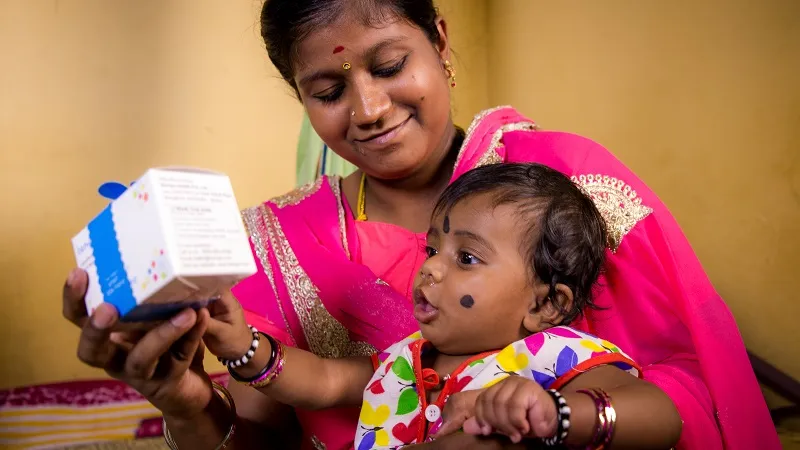
The low-cost novel bracelet that saved baby Rithiksha’s life is from Bempu, a Bangalore-based medical device social enterprise that is giving a fighting chance to newborns who might be at the risk of hypothermia – a perilous condition that is the leading cause of deaths in developing world. Parents are immediately alerted about a fall in temperature because of the beeping mechanism. There is also a better chance of parents seeking medical help if the bracelet continues to beep, saving their newborn’s life.
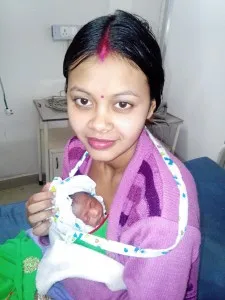
Bempu helps babies maintain their body temperature and gain healthy weight in the first month, which leads to better development and even IQ later in their life. When the temperature drops (even a sustained drop of 0.5 degree), the baby begins to burn baby fat, which restricts the baby from gaining any healthy weight. This fat burning process causes the by-production of acid in the baby’s body, which begins to limit the baby’s breathing. If the baby is unable to breathe, the oxygen supply (hypoxia) is cut off, which can result in organ damage. Premature babies (the ones most at risk of hypothermia) can often have organ and developmental issues on getting cold (newborns often get cold when they have an infection) and these issues impale them their entire life.Bempu’s story
Bempu was founded in 2013 by Ratul Narain. A bachelor’s in Biomechanical engineering and a masters in mechanical engineering from Stanford, Ratul worked at Johnson and Johnson’s for six years in the cardiovascular space followed with a year at Embrace Innovations in the neonatal health space.
Ratul knew that it was the space of neonatal health that he wanted to invest himself in.
I’d had some exposure to neonatal health while working at Embrace. I wanted to create something that would have a massive impact. With the neonatal space, we are trying to make the biggest impact we can in people’s lives and their health. If you make a difference to a baby’s life, it actually has a drastic impact on the next 60–80 years of their life.
, says 31-year-old Ratul.

In 2013, Ratul journeyed across India to carry out on-ground field research identify the gaps in neonatal healthcare in India. He spent time in paediatric centres in high-end hospital to government hospitals and rural clinics across India. Ratul recalls, “I hung out there to understand the life of the doctor, the life of a patient, etc. I was literally there with a notebook listing the healthcare gaps I saw – why did a baby get sick? Why did a baby arrive dead at the hospital?”
Eight out of the 27 million babies born in India are underweight (less than 2.5kg). In the US, this number is one in 12 babies. Ratul says,
In the US, a hospital would keep an underweight baby in an incubator until the baby is at a healthy weight and only then discharge the baby. While in India, low birthweight babies are discharged even at 1.2 kg. These babies are at high risk for many issues, two of which are hypothermia and infections. We’re not a replacement for an incubator, but we offer thermal protection via thermal monitoring of these babies.
Usage and adoption
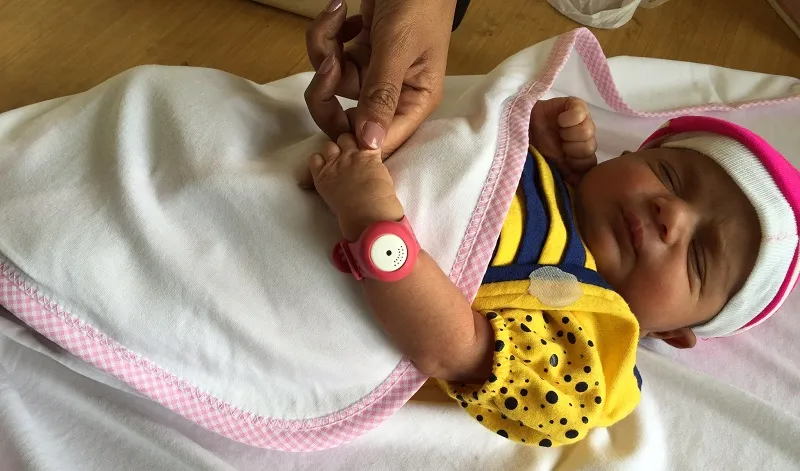
The Bempu bracelet needs to be prescribed by a doctor. It is available in about 150 centres across 11 states in India. Cloud Nine (Gurgaon), Surya Hospital (Pune), and Meenakshi Hospital (Bengaluru) are some of the centres that cater to a different target group and have been actively prescribing the bracelet.
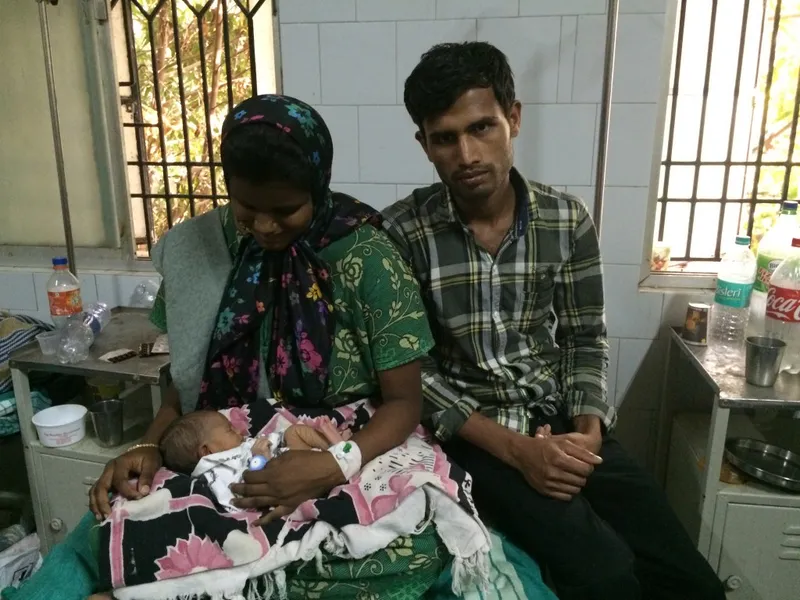
The Bempu bracelet is a disposable device that works for the first four weeks of an infant’s life, during the course of which it does not need to be charged. But such a device can easily be one that can returned, recharged, and made fit to use for another baby. Ratul agrees and explains why that model doesn’t work well for the primary target group,
Most of these women come from different rural pockets to deliver their babies or come to their hometown to deliver and then go back to another town/city/village. This model of renting out doesn’t currently exist in India. There are no collection centres in hospitals that can take a deposit, issue it, facilitate return, keep a log of the devices, clean, recharge and reissue them.
Ratul says that this is something they hope to address by working with ASHA workers and anganwaadis in the coming months.
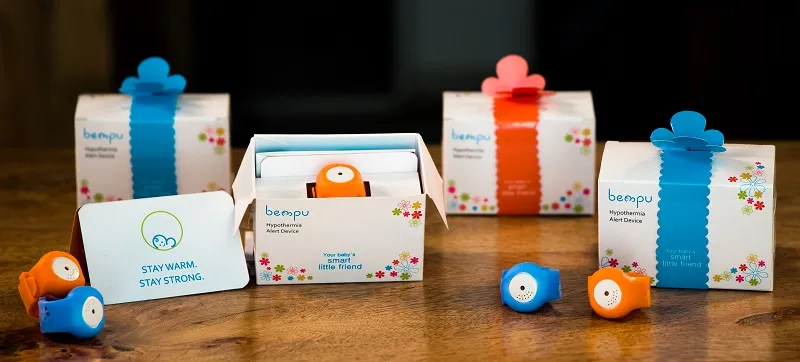
Ratul says that the team is often asked why the device doesn’t connect to smartphones via Bluetooth or send an SMS to alert the parents. He explains, “We’ve worked closely with our target group (low-income families) and understood their problems. The mother would be sleeping at night when the baby’s temperature falls and smartphone/Bluetooth connectivity would not solve the problem.”Additionally, this target group might not have access to smartphones, and Ratul insists that they’ve kept Bempu absolutely simple to avoid confusing the parent with too much information. Ratul adds, “We probed if we should have a temperature display on the bracelet, but it seemed to be a little more confusing to mothers. These mothers are already so worried because their babies are so sick. We decided to keep it extremely simple – blue light indicates the baby is fine, red light indicates the temperature has dropped, kicking off the beeping indicates that the baby needs assistance.”
Recognition and grants
In May 2014, Ratul was selected for Echoing Green Fellowship for Social Entrepreneurship. In July 2014, Bempu was selected for incubation at Villgro. In November 2014, Bempu won funding from Gates Foundation and Grand Challenges Canada and was able to get its first employees on board. In July 2015, Bempu was selected as one of 17 awardees (out of 750 applicants) for USAID’s Saving Lives at Birth contest. There has also been some funding from the Norwegian Government and the Korean Government.
Immediate and long-term challenges
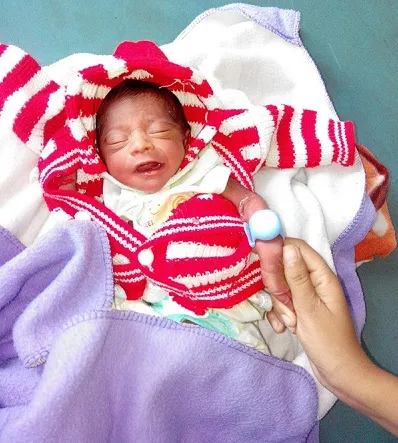
An immediate challenge in front of Bempu is to work with government centres, where the device can make the most impact. The grant that Bempu won from USAID is to work with several state governments in India. “Once pilots shows that our device is practically usable and then get it procured by the government is a beastly process for a startup. But we’re determined to do it because those babies need it the most,” says Ratul.We ask Ratul if working with the government can be frustrating because of the sheer hoops you’ve to jump, especially in India. He answers,
Well, we’ve heard stories about how tough it can be, but the government has a large focus on neonatal health. We met with the Ministry of Health and Family recently. There are many officials who are rooting for change that this bracelet can bring and are trying to work through the system to get these bracelets procured.
Ratul understands that these processes will take time with multiple stakeholders involved in the entire chain. Health being a state issue, Bempu will have to work with each state government separately to capture its desired impact of reaching every baby in need.







